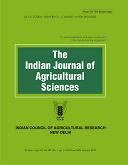Segregating progenies from 19 crosses of potato (Solanum tuberosum L.) developed at the International Potato Center (CIP), Peru were tested during 2008-2013 for adaptation and yield attributes in the sub-tropical plains of India i.e. Modipuram, Uttar Pradesh. The progenitors of the crosses showed early foliage maturity, tolerance to biotic stresses and processing attributes. In initial clonal generations, selection was based on desirable tuber attributes and tuber yield components. Clones showing viral symptoms, producing long stolons, irregular tuber shape, russetting, cracking or deep eyes were eliminated. From the initial population of 17,300 true seeds, 13 advanced clones of five crosses were subjected to evaluation in replicated trials and nine better performing clones were selected. Critical evaluation of these nine clones resulted in the identification of five promising clones (305069.701, 305111.701, 305138.702, 397186.703 and 397186.704) with high tuber yield (43 to 50 t/ha) and desirable tuber attributes. These advanced clones hold promise of becoming new potato cultivars and may be used in breeding programmes aiming at high productivity in the region for improving the livelihood of farmers.
Evaluation and selection of true potato (Solanum tuberosum) seed families in North-Central plains of India.
Citation: Luthra, S.K.; Sharma, N.; Gupta, V.K.; Singh, S.V.; Kumar, V.; Singh, B.P.; Bonierbale, M.; Kadian, M.S. 2017. Evaluation and selection of true potato (Solanum tuberosum) seed families in North-Central plains of India. Indian Journal of Agricultural Sciences. (India). ISSN 0019-5022. 87(10):1404-1408.
2018-05-29
POTATO AGRI-FOOD SYSTEMS, POTATOES, SEED SYSTEMS
Asia
India
journal_article

